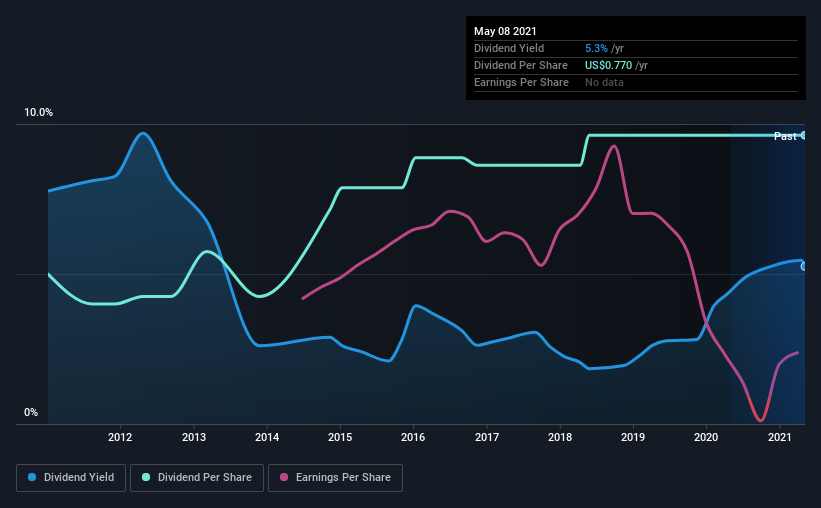Dividend Investors: Don't Be Too Quick To Buy Universal Insurance Holdings, Inc. (NYSE:UVE) For Its Upcoming Dividend
Some investors rely on dividends for growing their wealth, and if you're one of those dividend sleuths, you might be intrigued to know that Universal Insurance Holdings, Inc. (NYSE:UVE) is about to go ex-dividend in just three days. Ex-dividend means that investors that purchase the stock on or after the 13th of May will not receive this dividend, which will be paid on the 21st of May.
Universal Insurance Holdings's next dividend payment will be US$0.16 per share, on the back of last year when the company paid a total of US$0.77 to shareholders. Based on the last year's worth of payments, Universal Insurance Holdings stock has a trailing yield of around 5.3% on the current share price of $14.66. Dividends are a major contributor to investment returns for long term holders, but only if the dividend continues to be paid. As a result, readers should always check whether Universal Insurance Holdings has been able to grow its dividends, or if the dividend might be cut.
Check out our latest analysis for Universal Insurance Holdings
If a company pays out more in dividends than it earned, then the dividend might become unsustainable - hardly an ideal situation. It paid out 79% of its earnings as dividends last year, which is not unreasonable, but limits reinvestment in the business and leaves the dividend vulnerable to a business downturn. We'd be concerned if earnings began to decline.
When a company paid out less in dividends than it earned in profit, this generally suggests its dividend is affordable. The lower the % of its profit that it pays out, the greater the margin of safety for the dividend if the business enters a downturn.
Click here to see how much of its profit Universal Insurance Holdings paid out over the last 12 months.
Have Earnings And Dividends Been Growing?
Companies with falling earnings are riskier for dividend shareholders. If earnings fall far enough, the company could be forced to cut its dividend. Universal Insurance Holdings's earnings per share have fallen at approximately 23% a year over the previous five years. Ultimately, when earnings per share decline, the size of the pie from which dividends can be paid, shrinks.
The main way most investors will assess a company's dividend prospects is by checking the historical rate of dividend growth. In the past 10 years, Universal Insurance Holdings has increased its dividend at approximately 6.8% a year on average. That's intriguing, but the combination of growing dividends despite declining earnings can typically only be achieved by paying out a larger percentage of profits. Universal Insurance Holdings is already paying out a high percentage of its income, so without earnings growth, we're doubtful of whether this dividend will grow much in the future.
The Bottom Line
Is Universal Insurance Holdings an attractive dividend stock, or better left on the shelf? We're not overly enthused to see Universal Insurance Holdings's earnings in retreat at the same time as the company is paying out more than half of its earnings as dividends to shareholders. These characteristics don't generally lead to outstanding dividend performance, and investors may not be happy with the results of owning this stock for its dividend.
So if you're still interested in Universal Insurance Holdings despite it's poor dividend qualities, you should be well informed on some of the risks facing this stock. Our analysis shows 1 warning sign for Universal Insurance Holdings and you should be aware of this before buying any shares.
We wouldn't recommend just buying the first dividend stock you see, though. Here's a list of interesting dividend stocks with a greater than 2% yield and an upcoming dividend.
This article by Simply Wall St is general in nature. It does not constitute a recommendation to buy or sell any stock, and does not take account of your objectives, or your financial situation. We aim to bring you long-term focused analysis driven by fundamental data. Note that our analysis may not factor in the latest price-sensitive company announcements or qualitative material. Simply Wall St has no position in any stocks mentioned.
Have feedback on this article? Concerned about the content? Get in touch with us directly. Alternatively, email editorial-team (at) simplywallst.com.

 Yahoo Finance
Yahoo Finance 
